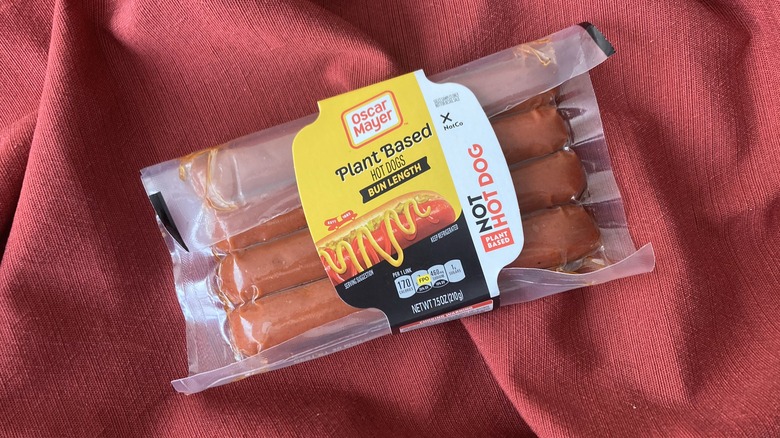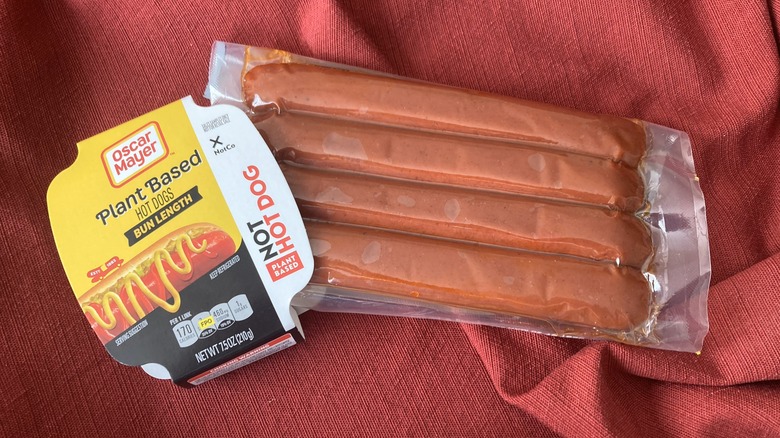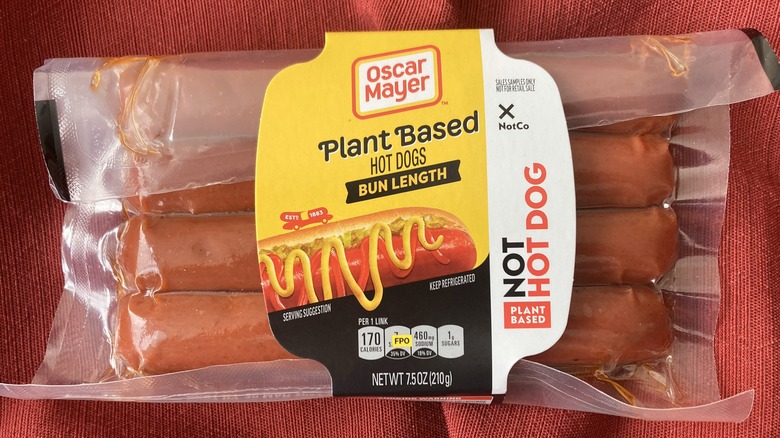Oscar Mayer Plant-Based Hot Dogs: These Vegan Franks Are For The Dogs
Remember the days when having an Oscar Mayer hot dog meant enjoying a baseball stadium-ready meal-in-a-bun you could carry around in one hand and still have a free hand to hold the cup of Coke that came with it? Somewhere along the line, the choices became more complicated. Suddenly, there was a deli case worth of hot dog options to muddy the waters — even uncured dogs that attempt to roll back the ultra-processing that hot dogs are famous for. Thanks to 21st century food wizardry, there are now plant-based frankfurters from the brand with the first and last name in home hot dog happiness.
The newly released Oscar Mayer Plant-Based Not Hot Dogs herald a food production connection between the brand's parent corporation, Kraft-Heinz, and Not Co., a Chile-based producer focused on replacing animal ingredients with plant substitutes. With the cruelty-free food movement expanding by leaps and bounds, it was only a matter of time before Oscar Mayer made a move in a mindful non-meat direction. While traditional hot dogs have had to overcome a lot of falsehoods, plant-based dogs will face challenges, too. Is it possible to capture the familiar taste and texture of a classic hot dog in an animal-free analog? I was curious to learn the truth, so I taste-tested them for myself.
The ingredients are a wonderland of weirdness
Eating a plant-based diet is relatively simple. All you have to do is read every label on every item you ever eat to make sure there's no meat, egg, or dairy product included. This is easy when you stick to whole foods and produce. But when choosing processed items like a Not Hot Dog, things get a little stickier. Oscar Mayer and Not Co. go for broke by including a host of animal-free elements in an effort to recreate the experience of a real hot dog — a food that even the most unconcerned diner can readily identify by taste and texture.
But reading the label is like a trip down a rabbit hole of questionable ingredients. Having wheat gluten as a base makes sense; this is a readily available staple ingredient in many plant-based meat alternatives. Including methyl cellulose, a food-safe wood-based thickener, is a bit more confusing. With all the grains and otherwise culinary-centric options out there, why not choose something more easily identified as food instead? Many of the flavorings are reasonable, spices like garlic powder and smoke flavor. But when I reached the spot on the listings that includes carrageenan, a troublesome seaweed-based thickener, I realized this plant-based food is not a healthful alternative to meat products. It's merely a new way of making a mass-produced hot dog, which has always been a questionable product. To this mostly plant-based eater, Oscar Mayer's reimagining of the original is just as dubious.
These alternative dogs will be available in grocery stores sometime in 2024
According to the press release on the Kraft-Heinz website, Oscar Mayer Plant-Based Not Hot Dogs will be in grocery store cold cases sometime in 2024, though the breakthrough food is due to be featured at the Natural Products Expo West in California from March 12 through March 16. The company calls out these franks as part of an expanding line of the NotCo partnership, resulting in other animal-free items like Kraft NotMac&Cheese and NotMayo.
The idea of a traditionally animal-oriented food banner jumping headlong into the plant-based sector signals an important shift that's been rolling along for quite some time with food producers dedicated to vegan and vegetarian possibilities. MorningStar Farms has a full line of meatless frozen foods, as does Quorn (which uses a surprising ingredient in its meat substitutes), and Boca, a company already owned by Kraft. And while some vegetarians might want to think twice about eating a veggie dog, adding plant-centric options under labels that have become household staples is a clever twist that makes it easier for dedicated meat-eaters to give these new possibilities a try. Whether the company positions Not Hot Dogs right next to the other Oscar Mayer wieners for a side-by-side sales battle or relegates them to the meatless sections of grocery retailers remains to be seen.
The price is out of line with ordinary hot dogs
Anyone familiar with grabbing a pack of regular ol' hot dogs will recognize the affordability of traditional meat-based franks. Oscar Mayer recommends its hot dog prices be kept in the neighborhood of $4.99 for an eight-pack, making this super-cheap food come out to about $0.62 per frank. The vegan option will retail for a suggested price of $5.99 for four dogs, putting the plant-based version at almost $1.50 each. Cautious shoppers who like to make their money go as far as possible will likely choke at the difference, which could be cost-prohibitive and put Oscar Mayer's introduction into the world of animal-free eating off to a rocky start.
There's something to be said for any shopper willing to spend more to remove animal products from their diets. Voting with your wallet has always been an effective strategy in driving which alternative items enjoy a long life and which experience a quick demise. It would seem to be in the best interest of garnering success to make the price more competitive to start with. Given time and market response for taste-testers, perhaps Kraft-Heinz will move in this direction. With a world of other options lining the refrigerated food section, shoppers may have trouble coughing up the cash for an unproven product, even if it offers the possibility of a cruelty-free dinner.
They're not exactly a nutrition powerhouse
It's easy to assume the label "plant-based" also means "healthy." A huge driver of the plant-based movement is offering more mindful versions of familiar foods to make the transition easier for those who want in. But hot dogs in general have never been viewed as a healthy food product, and Oscar Mayer made a marketing strategy out of targeting kids and families in need of fast dinners, none of which is synonymous with nutritious noshing. Trying to sway consumer practices away from meat-based hot dogs to plant-based hot dogs may not be the playing field where nutrition is a key factor.
The information on the Not Hot Dogs label does its best to prove this out. Each frank carries 140 calories, 9 grams of fat, 650 milligrams of sodium, and 10 grams of protein. Compared to the brand's bun-length uncured beef hot dog profile of 170 calories, 16 grams of fat, 460 milligrams of sodium, and 6 grams of protein, there's a real hit-or-miss factor that improves slightly on the calories, fat, and protein, but degrades a bit on sodium. By contrast, the established brand LightLife offers soy-based franks with 60 calories, 2 grams of fat, 350 milligrams of sodium, and 8 grams of protein, creating an alternative in the nutritional arena that Oscar Mayer plant-based dogs can't best.
They're an innovative add to the Oscar Mayer hot dog line
The competition between Oscar Mayer and Ball Park as well as Nathan's, Hebrew National, and other frankfurter brands, can make it challenging enough for hot dog fans to choose a favorite meat frank. But when it comes to Oscar Mayer's own line of frank-style foods, there are so many options, even devoted aficionados of the Wienermobile (read the story behind that and other food-based vehicles) may have trouble picking out the dog that's tops over the rest. Classics, all-beef franks, smokies, cheese-stuffed dogs ... every option maximizes the idea of meat-based eating. Can you possibly introduce a plant-based player into an animal-based game and expect it to have even a fighting chance?
The best hope Oscar Mayer may have in expanding its offerings to include a 21st century category like meat-free hot dogs is brand recognition. The name holds such a link (pun intended) to the hot dog industry, dropping a few packages of franks in the same shape, style, and packaging as the usual items but with a whole new formula may offer enough consumer trust to lead die-hard dog eaters in a new direction. The real test is quality, especially when anyone who knows what a hot dog should taste like takes their first, and possibly last, bite.
Review: There's no joy in these plant-based Not Hot Dogs
As a 99.9% plant-eater who relishes a well-done animal product switch-over, I was stoked to discover Oscar Mayer was finally entering the vegan food fray with a hot dog that might measure up to the ingrained meat-based dog experience. What a disappointment to discover that the company hasn't hit the mark. Trying the bun-length version should have been a home run for a new ball park favorite, but there's just too much strangeness that can't be overcome. The casing on these dogs is visible, and even bursts when heated, an unappetizing possibility I had never considered. The dog itself is an unnatural red color achieved by the inclusion of vegetable juice and acerola cherry powder called out in the ingredients list on the label. Visually, it's just not a happy scene. And preparation instructions call for heating the dogs to a 165-degree-Fahrenheit internal temperature, differing vastly from the familiar grill-boil-fry-microwave instructions I know by heart from my previous meat-based frank experience. Who measures the internal temperature of a hot dog, regardless of what it's made of?
As for the taste and texture, let's just say these franks are oddly greasy for having less fat than their meat-based counterparts. The over-spiced flavor can't salvage the pretty spot-on consistency of the dog itself. If instant indigestion is any indication, Oscar Mayer has some clean-up to do in the plant-based hot dog aisle if it aims to compete.






